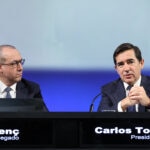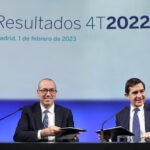"Banks' most important contribution to society is granting credit to the real economy"
BBVA Chair Carlos Torres Vila spoke of the vital role that banks play in the economy when presenting the 2022 results. “Banks act as catalysts of activity by granting credit to the real economy,” he said. “This may be banks’ greatest contribution to society,” he added. In this regard, he underlined that in 2022, the BBVA Group granted nearly €200 billion in new financing to businesses. At the press conference, BBVA CEO Onur Genç also shared the bank’s outlook for 2023.

Amid a context of high inflation, low growth and uncertainty surrounding the evolution of the global economy in 2023, the BBVA Chair emphasized that: “We want to create opportunities for everyone - and everyone means everyone - not just our customers, but society as a whole.” In his opinion, the best way to have this positive impact is with the very activity that the banking business carries out. First, by making credit available to the real economy - companies and families - but also through long-term financing of structural challenges, such as innovation, digitization and above all, sustainability.
Carlos Torres Vila stressed BBVA’s contribution to society by financing entrepreneurship and the work of both the BBVA Microfinance Foundation and the BBVA Foundation. Similarly, the bank and its foundations have committed €550 million to social initiatives between 2021 and 2025. By the end of 2022, “we had devoted over €230 million - over 40 percent of the total objective - and this has allowed us to support over 62 million people through social programs. We are working to promote a more inclusive society, leaving no one behind,” he said.
Companies’ interest match those of society
The BBVA Chair explained the positive impact that the market economy has on all of society, underscoring that “companies’ interests match those of society.” In this regard, he argued that: “In a market economy like ours, which is based on private initiative for the proper allocation of resources, this is what leads to investment that creates jobs, growth and well-being over the long-term.”
Carlos Torres Vila views the work that companies do in the economy from this standpoint, work he feels “is irreplaceable.” Furthermore, he recalled the need to correct the imperfections in the free market through regulation. The BBVA Chair believes that it is essential for companies to make profitable investments “so that the economy works in a society like the one we have in Spain, in Europe, and in all of the western world.”
In terms of the impact of uncertainty and inflation, he called for “the adoption of measures to support certain groups, and compensate them for their loss of purchasing power in a reasonable way.” By way of example, he also mentioned the salary conditions of the banking sector, which BBVA recently improved for its employees in Spain, surpassing what is established in the collective agreement for the sector in order to help alleviate the effects of inflation.

On this note, he feels that the recovery of Spanish banks’ profitability is good news for the entire economy following several years of negative interest rates. In terms of BBVA Spain’s reported profit from 2022, he indicated that “if we look back, we haven’t attained these results in Spain since 2010, and along the way we have had many years of negative results.” “Now that interest rates have normalized, this leads to the recovery of what a sustainable business needs to be, making the cost of capital profitable. Because if not, attracting capital isn’t possible, and that is the worst thing that could happen to Spain,” he stated.
In addition, he defended the introduction of models to foster private investment in Europe, such as the recent legislation in the U.S to encourage the inflow of capital toward decarbonization initiatives. “It could make sense for us to copy the good things that this model has. And the Next Generation funds could increase with private investment,” he added.
Over €8.2 billion in shareholder distributions in two years
The BBVA Chair explained that the “excellent results” that the bank presented this Wednesday and “the strong capital position” have made it possible to “significantly increase distributions to our shareholders.” In fact, in two years (2021 and 2022), BBVA will distribute over €8.2 billion to its shareholders taking into account the €4.6 billion cash dividend¹ from this period; the €3.16 billion share buyback carried out by BBVA in 2022; and the new €422 million² buyback program that the bank announced on Wednesday at the presentation of its annual results. Furthermore, “we have a very good outlook that if things continue to go well, we can carry out additional distributions to our shareholders,” he affirmed.
The BBVA Chair also discussed the goals that BBVA announced in November 2021 at its Investor Day, goals that it aims to achieve in three years. “In 2022, we made significant progress in our strategy to accelerate profitable growth, which was the title of the Investor Day.” In terms of the objectives specifically, he noted that “we have the potential to do much better in some cases with respect to the goal we had set for ourselves.” However, he made it clear that the goals will remain intact for now because “very little time has passed.”
Outlook for 2023
The BBVA CEO emphasized the strong performance of the digital bank in Italy, where in just over a year, the customer acquisition figures are “three times better than we expected.” The bank had 160,000 customers at the end of 2022, and this year BBVA expects to add another 160,000.
Regarding the expectations for BBVA’s business in 2023, Onur Genç was “optimistic about the future” in Spain, Mexico and all the other countries where the bank operates. First, “core revenue will continue to grow, and we expect it to grow around 25 percent” in constant euros in the Group’s accounts. Second, the CEO announced that “we will see higher costs, in line with the average inflation in the group, with a focus on maintaining positive jaws once again this year.” Finally, he estimated that “the cost of risk will be around 100 basis points.”